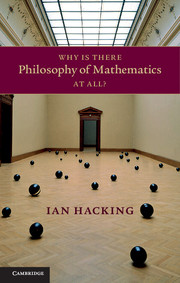Book contents
Chapter 3 - Why is there philosophy of mathematics?
Published online by Cambridge University Press: 05 June 2014
Summary
A perennial topic
Why is the philosophy of mathematics ‘perennial’? Perennial in the gardener’s sense: not always flourishing, but reappearing, to flourish in almost every fit season. That is what I mean by asking: why is there philosophy of mathematics at all?
This is not the question of why the philosophy of mathematics is a thriving academic sub-speciality right now. There are a great many things about mathematics for philosophical minds to contemplate. Classic examples are the antinomies, introduced by Russell’s paradox, Gödel’s incompleteness theorems, the continuum hypothesis, and, more generally, intuitionism and constructivism. They alone provide ample sustenance for a speciality called ‘philosophy of mathematics’, and there is much more. Problems generated by computation, P/NP, for example (Stephen Cook’s problem, §2.21). Is that a mathematical question or a philosophical question? But that’s all twentieth-century, even if some of if it has Kantian roots.
If philosophical thinking about mathematics were confined to such matters, it would be no more and no less important than the philosophy of any other special science, driven by fairly recent puzzles about radically new results and events. It would be filed away in discreet academic locales, just like the philosophy of physics, the philosophy of biology, the philosophy of economics, or, less familiar but highly innovative, the philosophy of geography.
- Type
- Chapter
- Information
- Why Is There Philosophy of Mathematics At All? , pp. 79 - 114Publisher: Cambridge University PressPrint publication year: 2014



